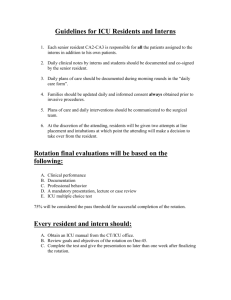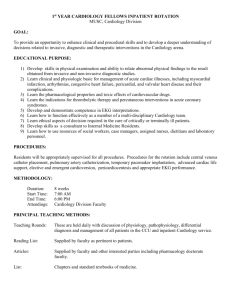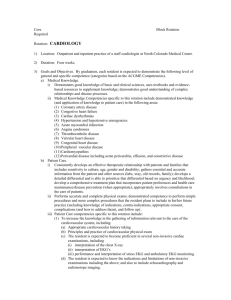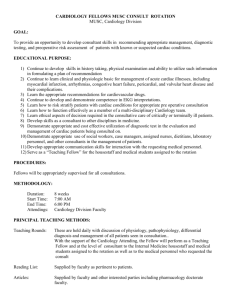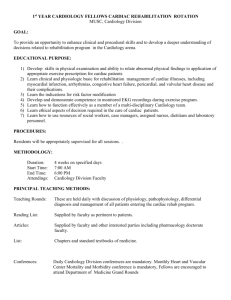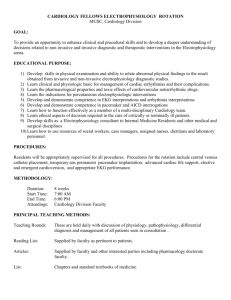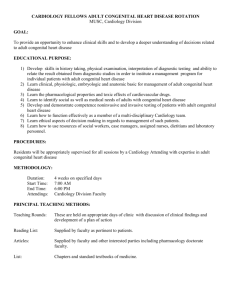Rotation: Cardiology Firm
advertisement
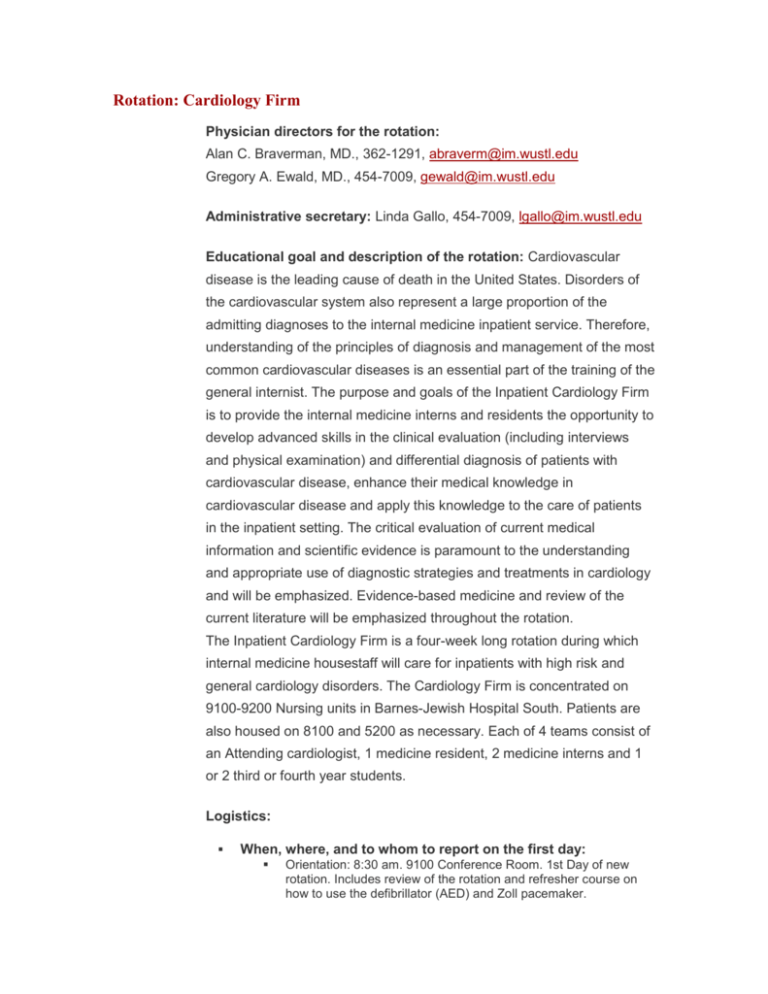
Rotation: Cardiology Firm Physician directors for the rotation: Alan C. Braverman, MD., 362-1291, abraverm@im.wustl.edu Gregory A. Ewald, MD., 454-7009, gewald@im.wustl.edu Administrative secretary: Linda Gallo, 454-7009, lgallo@im.wustl.edu Educational goal and description of the rotation: Cardiovascular disease is the leading cause of death in the United States. Disorders of the cardiovascular system also represent a large proportion of the admitting diagnoses to the internal medicine inpatient service. Therefore, understanding of the principles of diagnosis and management of the most common cardiovascular diseases is an essential part of the training of the general internist. The purpose and goals of the Inpatient Cardiology Firm is to provide the internal medicine interns and residents the opportunity to develop advanced skills in the clinical evaluation (including interviews and physical examination) and differential diagnosis of patients with cardiovascular disease, enhance their medical knowledge in cardiovascular disease and apply this knowledge to the care of patients in the inpatient setting. The critical evaluation of current medical information and scientific evidence is paramount to the understanding and appropriate use of diagnostic strategies and treatments in cardiology and will be emphasized. Evidence-based medicine and review of the current literature will be emphasized throughout the rotation. The Inpatient Cardiology Firm is a four-week long rotation during which internal medicine housestaff will care for inpatients with high risk and general cardiology disorders. The Cardiology Firm is concentrated on 9100-9200 Nursing units in Barnes-Jewish Hospital South. Patients are also housed on 8100 and 5200 as necessary. Each of 4 teams consist of an Attending cardiologist, 1 medicine resident, 2 medicine interns and 1 or 2 third or fourth year students. Logistics: When, where, and to whom to report on the first day: Orientation: 8:30 am. 9100 Conference Room. 1st Day of new rotation. Includes review of the rotation and refresher course on how to use the defibrillator (AED) and Zoll pacemaker. Rounds and conferences: The Cardiology Firm rotation is a 4-week rotation. Interns and Residents must be ready for floor duties at 7:30 a.m. on weekdays. The call schedule is on a cycle of: long—off--short—off. House officer hours may not exceed the ACGME duty limits. Each of 4 teams on the Cardiology Firm consists of one resident and two interns. One or 2 medical students also participate on the rotation. Each team is supervised by an Attending cardiologist. Interns and residents continue to attend mandatory Internal Medicine Grand Rounds and continue to see patients in their Internal Medicine Continuity Clinic. During this Clinic, they are excused from cardiology patient care duties. Interns and residents are expected to use the time during this rotation for resident H & P, review of clinical data including EKGs, labs, radiology, echocardiography, catheterization data, reading/research, documentation, and supervision of the medical students as well as discussion/rounding with the attending physician. Residents may experience educational interactions with the supervising attending physician beyond the functional time required for usual patient care. The teaching interaction will be integrated into the daily work schedule and will total a minimum of 4.5 hours weekly. A sample schedule for the rotation follows Monday Tuesday Wednesday Thursday House Staff House Staff Cardiology Patient Management Conference House Staff Work Rounds Work Rounds 7:00 7:30 House Staff 8:00 8:30 9:00 Work Rounds Attending Rounds Work Rounds Attending Rounds Weiss Rounds 10:00 Resident's Report 10:30 10-11am 9:30 EKG Review (Fellow/Interns/ Students) Cardiology 12:00 Cardiology Attending Rounds Resident's Report Medicine Grand Rounds Attending Rounds House Staff Work Rounds 10-11am Chief Resident's Rounds Core Cardiology Imaging Conference Core 11:00 11:30 Friday CT Surgery/Card Conference (1st Friday) Cardiology Resident Report CPC 12:30 Core Conf Diagnosis/ Treatment Curriculum Curriculum (Echo Conference) Physical DX (Students) Firm Admin Mtg 13:00 13:30 14:00 14:30 15:00 Professor's Rounds (Students) 15:30 16:00 16:30 ACES Core Curriculum (Students) Hours,Call: See monthly team assignment sheet and call schedule Call is on a 4 day cycle: Long—Off—Short—Off schedule. On call interns/residents must leave by 9:30 pm and may not return before 7:30 am post-call On call interns/residents must leave by 9:30 pm and may not return before 7:30 am post-call Educational purpose (curriculum): All of the Competency Milestones are pertinent to this rotation. Areas of special focus are noted below. Interns should be able to be able to develop a basic level of competence in the skills listed. JARs should be able to perform the skills with less supervision, at a higher level (eg, elicit subtle physical findings), in multiple patients and in more complex patients. SARs should be almost independent in these skills, and able to deal with unexpected events and ambiguous situations. Patient care By the conclusion of the rotation, PGY1 residents will demonstrate ability to perform an appropriate cardiac history and physical, documenting their findings in an appropriate summary, with appropriate generation of a differential diagnosis list. By the conclusion of the rotation, PGY2 and 3 residents will perform the above skills, and will also evidence appropriate ability to independently generate an appropriate management plan. While on the cardiology rotation, the resident will be able to demonstrate proficiency in the physical exam features of common types of valvular heart disease and congestive heart failure and to recognize symptoms of coronary artery disease. During the cardiology rotation, the resident will enhance his or her skills in obtaining and presenting a hypothesis driven history and problem-based assessment and plan of common cardiovascular disease presentations including acute chest pain syndromes, CHF exacerbations, syncope and arrhythmias. Medical knowledge Demonstrate an appropriate analytic approach to cardiac conditions, and a satisfactory basic and clinical knowledge of cardiac function and pathophysiology. Understand current evidence-based practices in primary and secondary prevention of cardiovascular disease, especially atherosclerotic coronary artery disease. Understand the pathophysiology and prognosis of common cardiovascular diseases and their medical and non-medical management. These may include: Acute myocardial infarction and its complications Congestive heart failure (systolic and diastolic) Cardiomyopathies (ischemic, non-ischemic, dilated, hypertrophic, infiltrative) Infective endocarditis Myocarditis Pericardial disease Valvular heart disease Arrhythmias (SVT, atrial fibrillation, atrial flutter, ventricular tachycardia, bradyarrhythmias, sick sinus syndrome, conduction abnormalities) Pacemakers and Implantable defibrillators and their complications Hypertension/hypertensive crisis Syncope Hyperlipidemia Pulmonary hypertension and cor pulmonale Pulmonary embolism Congenital heart diseases Aortic diseases (aortic aneurysm, aortic dissection) Practice-based learning and improvement Acute and chronic coronary artery disease All interns and residents should understand their limitations of knowledge and judgment; ask for help when needed; and be self motivated to acquire knowledge Accept feedback, learn from own errors and develop selfimprovement plans Residents will demonstrate self-initiative in the use of information technology to access and retrieve materials for self-education regarding cardiac cases. Residents will be expected to show progressive learning throughout the rotation, with emphasis on learning from any cognitive or procedural errors. They are also expected to facilitate any quality improvement initiatives in place. Interpersonal and communication skills Demonstrate caring and respectful behaviors with patients, families, including those who are angry and frustrated; and all members of the health care team Counsel and educate patients and their families Conduct supportive and respectful discussions of code status and advance directives Facilitate the learning of students and other health care professionals Demonstrate ability to convey clinical information accurately and concisely in oral presentations and in chart notes Residents are expected to demonstrate professional communication skills throughout their interactions with cardiology patients. In addition, residents will be assessed for appropriate communication with the WUSM Cardiology attending, including setting clear expectations for duty hours and inpatient duties. Residents are expected to act as a constructive and proactive member of the Cardiology Firm team Professionalism Demonstrate respect, compassion, and integrity Demonstrate a commitment to excellence and on-going professional development Demonstrate a commitment to ethical principles pertaining to provision or withholding of clinical care, confidentiality of patient information, informed consent, and other aspects of clinical care Develop an appreciation for the ethical, cultural and socioeconomic dimensions of illness, demonstrating sensitivity and responsiveness to patients’ culture, age, gender, and disabilities Residents should display initiative and leadership; be able to delegate responsibility appropriately Throughout the Cardiology Firm rotation, residents are expected to exhibit reliability in their clinical duties, as well as integrity and respect in their interactio Systems-based practice Work effectively with others (such as nurses, secretaries, social workers, nutritionist, interpreters, physical and occupational therapists, technicians) as a member of a health care team Advocate for quality patient care and assist patients in dealing with system complexities Understand and appreciate the importance or contacting the patient’s primary care provider at the time of admission of soon thereafter Residents should develop proficiency in leading the health care team, organizing and managing medical care Learn the cost-effective use of diagnostic and therapeutic technology Teaching Methods: Progressive, graduated responsibility for performance of the admission history and physical examination, formulation of diagnostic and therapeutic plans, writing of orders, continued inpatient care, and performance of bedside procedures, all under the supervision of attending physicians Inpatient: Residents will participate in the evaluation and management of cardiology patients at BJH cared for by physician of the BJH and WUSM faculty and Cardiovascular Division, Department of Medicine. Outpatient: Interns and Residents and medical students may arrange to spend time in the outpatient cardiology clinics of any of the attending cardiologists in the Center for Advanced Medicine, 8th floor, Heart and Vascular Section. This should be arranged with the attending physician and resident physician. Teaching rounds are held up to 6 times/week at the discretion of the attending physician. These consist of presentations by the medical students, interns and residents to the attending physician as well as physical diagnosis rounds at the bedside and didactic presentations by the house officers and attending physician. Review of echocardiograms, chest x-rays, CT scans, cardiac catheterization films and stress tests are emphasized in these sessions. Electrocardiograms are to be read daily on rounds with the attending physician. Interns and Residents are expected to review a series of electrocardiograms and demonstrate proficiency and competency in ECG interpretation appropriate for the level of training. Required Presentations: Interns and Residents present cases at teaching rounds and are expected to research and Residents are to present at a weekly Resident’s report held each Friday. Didactic Lectures: Interns and Residents are expected to attend the following didactic lectures during the Inpatient Cardiology Firm Cardiology Core Curriculum Conference. Mondays at 12 noon. 4300 Conference Room. Cardiology Diagnosis/Treatment Conference. Tuesdays at 12 noon. 4300 Conference Room (includes echo mini-course July-Sept). Cardiology Grand Rounds. Every other Wednesday, 7:30 am, East Pavilion Auditorium. September-June Schedule. Combined Cardiology/CT surgery Conference. 1st Friday of the month. 7:00 am. 17th floor Queeny Tower Board Room The mix of diseases, patient characteristics, and types of clinical encounters, procedures, and servicesPatients come from the admissions through the emergency room; from transfers from outside hospitals and from direct admissions from the CAM clinic and referring cardiologists’ offices. Patients encountered reflect the diverse nature of pathology present in the local urban area as well as that of St. Louis County and the greater metropolitan area. Patients also reflect the disease states present in rural Missouri and Illinois. There is equal exposure to men and women of diverse ethnic and socioeconomic backgrounds. Reading lists, pathological material, and other educational resources to be used: Braunwald’s Heart Disease: A Textbook of Cardiovascular Medicine Cardiology Firm Reading Curriculum: A series of journal articles and reviews on current topics in cardiovascular medicine Online access to standard cardiovascular texts, journals, Up-toDate and medical literature through the Becker Library and internet access. Interns and residents are encouraged to read extensively during their cardiology rotation.Click here for reading list. EKG interpretation: Interns and residents on the Cardiology Firm are expected to become proficient in recognition and interpretation of common EKG patterns. Web-based EKG sessions to be utilized for learning. Method of evaluation of resident performance: Resident Performance – Residents are oriented to the rotation expectations at the beginning of the rotation and then receive a formative midpoint feedback evaluation, followed by a formal summative written evaluation at the conclusion of the rotation. The designated clinical faculty (Cardiology attending) completes a web-based electronic resident evaluation form provided by the Internal Medicine Residency office. The attending physician who evaluates the resident will elicit feedback from the team members, students, and other professionals regarding the resident’s competency performance. The evaluation is competency-based, fully assessing core competency performance. The evaluation is shared with the resident, is available for on-line review by the resident and is sent to the residency office for internal review. The evaluation is part of the resident file and is incorporated into routine performance review for directed feedback. Program and Faculty Performance – Upon completion of the rotation, residents complete a service evaluation form commenting on the faculty and service experience. These evaluations are sent to the residency office for review and the cardiology firm Director and Co-Director receive periodic copies of completed evaluation forms. Resident supervision: Level of residents' supervision by faculty members in patient care activities: Residents will participate in the evaluation and management of cardiology patients at BJH cared for by physician of the BJH and WUSM faculty and Cardiovascular Division, Department of Medicine. Each patient evaluated by the internal medicine resident will be seen with the cardiology attending during daily rounds. The management plan will be formulated by the intern and resident and discussed with the attending physician and the medical students. Updated: : 1/8/07
